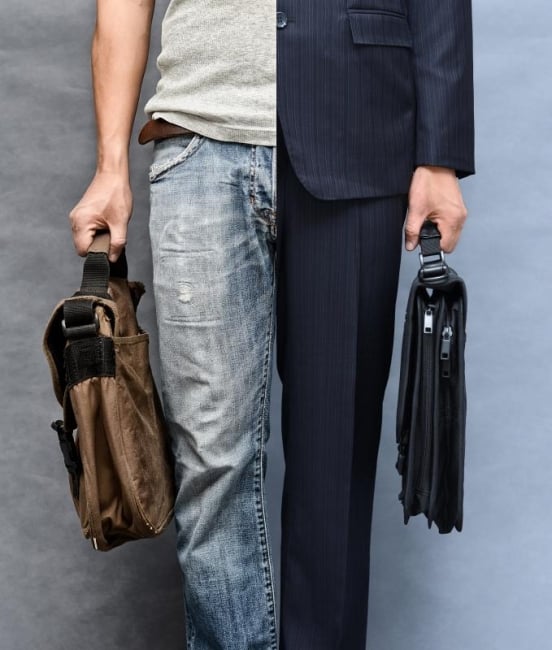You have /5 articles left.
Sign up for a free account or log in.

Hung_Chung_Chih/istock/getty images plus
The president of my university is an idiot.
He hears this every other Monday in Faculty Senate meetings. While people don’t exactly call him an idiot, they nevertheless manage to convey the sentiment. Not everyone, of course. Of the 50 people in the Zoom room, it’s always only the same handful who keep their videos on and do all the talking.
Many seem to think they could do a better job if they were president. Or vice president for finance. Or dean of admissions or athletics director or head of marketing. Or, if they bothered to care enough, any other administrative position.
In comments and questions -- that often aren’t questions but are in fact speeches -- they imply the president is an idiot.
And, to be honest, I can’t help but concur.
Dave had long been a much-admired professor of political science. A few years ago, when asked, he stepped into a role as vice provost. This summer, when the faculty voted no confidence in the president (who had come to us after a vote of no confidence at her previous institution), the Board of Trustees appointed Dave interim president for two years.
Letters to the Editor
A reader has submitted
a response to this essay.
You can view the letter here,
and find all of our Letters to
the Editor here.
Why would someone who had zero administrative ambition agree to a role that would cause him mostly grief?
Well, because he was a professor of American politics.
As we had four years before, we gathered in November 2016 at the home of mutual friends to watch the returns. Dave gave his usual quiz on the Electoral College to us -- a collection of professors, doctors, architects and other professionals -- and, as usual, we all bombed. Early in the evening, amid good food and copious drink, Dave shared his state-by-state predictions. And then, as the night went on, the merriment stopped and, at a certain point Dave, now pale, said, “I no longer know how to do my job” and went home.
So I kind of understood how taking on thankless administrative roles was an easier option than trying to teach American electoral politics in the age of Trump.
I offer this background as evidence that the president of my university is an idiot.
Dave was a beloved professor and a good colleague. His wife, a physician, had moved into management and earned a handsome salary. They were comfortable; Dave did not need an income boost. As someone who loves to shred the gnar, mountain bike and hike, he didn’t need to give up his free time to put on a tie and go into an office each day. Especially during a pandemic, when regional public institutions like ours are in the financial soup.
Even as I worried about my friend’s mental and physical health, I saw his presidency as an opportunity for what shared governance could look like, where the ideal could finally meet the reality. The administration was no longer a bunch of people whose ambitions had led them from the classroom decades before, who were out of touch with faculty concerns and student well-being. It was no longer us versus them. They were us. I spent the summer hopeful about what the future of a university I love and believe in could be. While I’ve logged time in elite institutions, I believe regional publics are the engines of democracy.
In the first Faculty Senate meeting after Dave had stepped up in this new role, not one person thanked him for taking on the second-hardest job in America. (Joe Biden is an idiot, too.) Instead, the previous president received words of tepid appreciation. From the very first meeting, faculty members imputed bad motives to things that hadn’t yet happened and would likely never occur. From that first meeting, even Dave’s friends and colleagues seemed suddenly to forget he was the same principled guy he’s always been.
Graffitied on the Walls
Like many others, our university must change or die. Those who read this publication and others that track national trends know our challenges are not specific or unique. But many of my colleagues seem not to look up from their desks. In a recent senate meeting, when asked how many members were concerned that our library decided to cancel the site license for The Chronicle of Higher Education, less than a third thought it was a problem. And I’m pretty sure it’s not just because they know how much valuable news they can get for free from Inside Higher Ed. Sinclair Lewis’s Main Street satirized this attitude 100 years ago. It’s called provincialism, friends.
What would it look like if we all kept up with the news about trends? If we were all aware of innovations in other places we could adopt and adapt? Or even if we talked to each other more and learned what was going on in our own university? What if we assumed the people who foolishly chose to step into administrative roles had good intentions and cared about making the institution better? What if we in the faculty no longer viewed those in administration as them, and remembered that until about 15 minutes ago, they were us?
A distrust of power comes with the territory when you’re trained as a critical thinker. We instruct our students not to take things at face value, to do primary research, to come up with good questions and to learn to express their own opinions based on evidence. Robust and open debate is essential. Though when you bring together a roomful of folks who all believe they are the smartest person in the room, it can mean meetings that stretch long beyond what’s needed.
Perhaps it is different in other places. Perhaps other universities run smoothly and the power shared between faculty and administration flows like forks of rivers that meet without turbulence. Perhaps not all professors raise their hackles when someone -- a former colleague, a friend -- puts on a suit.
The writing has been graffitied on the walls of academe for a long time. We can’t keep doing things the way they’ve been done for the past 150 years. Critique is easy and, for many academics, reflexive. We’ve all benefited from peer review, and most of us appreciate when others point out stuff we’ve missed -- that’s why those gaps are called blind spots. But many also know how that process can be ego bruising, how even the most positive scholarly reviews often start, “Brilliant but flawed.”
Many faculty members were the kids picked last for teams and, prizing and brandishing their hurt into brazen individualism, never learned to play well with others (um, guilty!). Many never got asked to dance or were teased for being more interested in planets than people. And now, given a little bit of a platform, they are like dogs responding to a doorbell, barking crazily whenever they hear certain words (athletics!). Too many think only of themselves, their programs, their departments, the dust bunnies in their offices, and forget they are part of a community. In these days of tenure buyouts, we see folks whose long-standing resentment leads them to want to burn the place down on their way out the door.
We’ve all seen bad administrators driven by ambition, so long out of the classroom they can’t even speak to students, so removed from their own scholarly disciplines their references are 30 years old. Those people should be voted down by the faculty and fired by boards of trustees.
But far more frequently, I’ve seen people step into administrative roles because they think they can be of service. They are willing to risk the scorn of faculty members who don’t realize “bloated” administrative salaries are paid for working every day, including in the summer, while the rest of us have time to devote to our research.
They grow accustomed to being called idiots. They do the jobs most of us don’t want and aren’t well suited for. And they know if they’re tossed out of their fancy offices, they can retreat to a profession they love.
What I know is that if we keep tossing out good people, we will all suffer.





